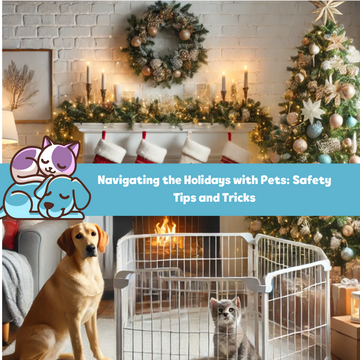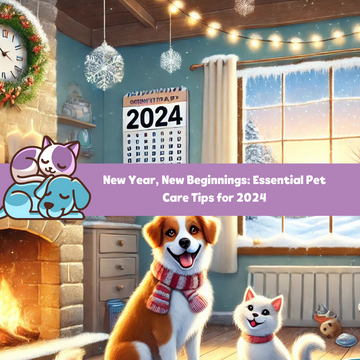As the holiday season approaches, many of us are filled with joy and excitement. However, while we celebrate with friends and family, it's essential to consider the well-being of our beloved pets. The holidays can pose various risks for animals, from festive decorations to holiday feasts. In this comprehensive guide, we will explore vital holiday safety tips for pets, ensuring that your holidays with pets are joyful and safe.
Understanding the Risks of the Holiday Season
During the holiday season, several common practices and decorations can endanger our pets. It's crucial to be aware of these risks to protect our furry companions:
-
Decorations: From glittering ornaments to twinkling lights, decorations can pose choking hazards or lead to injuries. Cats are particularly attracted to shiny objects, which can lead to accidental ingestion.
-
Plants: Holiday plants like poinsettias, mistletoe, and lilies can be toxic to pets. Consuming these plants can lead to various health issues, ranging from mild stomach upset to severe organ damage.
-
Food: The tempting aromas of holiday feasts can be hard for pets to resist. However, many foods we enjoy can be harmful to them. Chocolate, onions, garlic, grapes, and certain nuts are among the foods that can be toxic to dogs and cats.
-
Visitors: With the influx of guests during the holidays, pets may feel stressed or anxious. Sudden changes in their environment can lead to behavioral issues or escape attempts.
-
Cold Weather: For pets that spend time outdoors, cold weather can pose health risks. Frostbite and hypothermia are real dangers during winter months.
Holiday Safety Tips for Pets
To ensure a safe and happy holiday season for your pets, follow these essential tips:
1. Secure Decorations
- Choose Safe Decor: Opt for pet-friendly decorations that won't break easily. Avoid glass ornaments and tinsel that could be ingested.
- Keep Decorations Out of Reach: Place ornaments and decorations on higher branches of the tree or out of reach of curious paws.
- Anchor Your Tree: Secure your Christmas tree to the wall or ceiling to prevent it from toppling over if your pet tries to climb or knock it down.
2. Be Mindful of Holiday Plants
- Select Non-Toxic Plants: Consider using artificial plants instead of real ones. If you choose live plants, research to ensure they are safe for pets.
- Limit Access: Keep holiday plants out of reach or in areas where pets cannot access them.
3. Monitor Holiday Foods
- Avoid Table Scraps: While it may be tempting to share holiday treats with your pets, avoid giving them table scraps. Many human foods can be harmful to animals. Instead, provide them with special pet-safe treats.
- Educate Guests: Inform guests not to feed your pets, as well-meaning visitors may not know what foods are safe.
4. Create a Safe Space
- Provide a Quiet Area: Create a comfortable space for your pets where they can retreat during holiday gatherings. Include their bed, toys, and water to help them feel secure.
- Introduce Guests Gradually: Allow pets to meet guests one at a time to reduce their anxiety and stress.
5. Keep Your Pets Warm
- Bundle Up for Outdoor Time: If your pet spends time outdoors, ensure they have a warm coat or sweater, especially during frigid weather.
- Purchase one of our comfy pet sweaters.
- Limit Outdoor Time: Monitor the amount of time your pets spend outside to prevent frostbite and hypothermia.
6. Plan Ahead for Pet Care
- Pet Sitters or Boarding: If you’re traveling during the holidays, consider hiring a pet sitter or booking a reputable boarding facility to ensure your pet receives the care they need.
- Update Identification: Ensure your pet has a collar with identification tags and is microchipped. This is especially important during the holidays when pets may escape due to open doors or excitement.
7. Regular Vet Visits
- Schedule a Check-Up: Before the holiday season, schedule a visit to the vet to ensure your pet is healthy and up-to-date on vaccinations.
- Discuss Holiday Risks: Talk to your veterinarian about any specific concerns related to your pet’s health during the holidays.
Preparing Your Pet for the Holidays
To ensure a smooth transition into the holiday season, preparation is key. Here are some steps you can take:
1. Establish a Routine
- Maintain Consistency: Stick to your pet’s usual feeding and exercise routine as much as possible. This helps reduce stress and anxiety during busy holiday periods.
2. Introduce New Items Gradually
- Allow Time for Adjustment: If you're adding new decorations or items to your home, introduce them gradually. This gives your pet time to adjust and reduces the likelihood of curiosity-related accidents.
3. Socialize Your Pet
- Familiarize Them with Guests: If possible, have friends or family visit before the holidays to help your pet become accustomed to new people in their space.
- Practice Commands: Reinforce basic commands and manners to help your pet behave appropriately around guests.
4. Keep Their Environment Comfortable
- Designate a Pet Area: Create a specific area in your home where your pet feels safe and comfortable, equipped with their favorite toys, blankets, and food/water.
FAQs
How do you keep your pets safe during the holiday season?
To keep your pets safe during the holiday season, secure decorations, be mindful of toxic plants and foods, create a quiet space for them, and ensure they stay warm. Always supervise your pets during gatherings and educate guests about safe practices regarding your pets.
How to prepare your pet for the holidays?
Prepare your pet for the holidays by establishing a consistent routine, introducing new items gradually, familiarizing them with guests, and creating a comfortable environment for them. Reinforce training commands to help them behave around holiday activities.
Can dogs eat table scraps during the holidays?
While it may be tempting to share table scraps with your dog during the holidays, it's best to avoid this practice. Many human foods can be harmful to dogs, including chocolate, onions, and certain fatty foods. Instead, provide them with special pet-safe treats.
Conclusion
We hope these holiday safety tips help ensure a joyful and safe holiday season for you and your pets. For more information on pet care and safety, check out our related post on "The Ultimate guide to pet-friendly food for cats and dogs." If you have any questions or need assistance, feel free to reach out through our Contact Us page at Jazzy Pet Paws!




